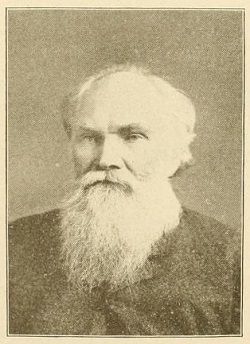Biography - James R. Hammett
 James
Richard Hammett was descended from Irish ancestry, his grandfather, Richard
Hammett, having been a native of County Cork, Ireland. Here the Hammetts
resided for a long period of time. Richard Hammett, as far as known, had
five children, four sons and one daughter, all of whom at different periods
emigrated to America.
James
Richard Hammett was descended from Irish ancestry, his grandfather, Richard
Hammett, having been a native of County Cork, Ireland. Here the Hammetts
resided for a long period of time. Richard Hammett, as far as known, had
five children, four sons and one daughter, all of whom at different periods
emigrated to America.
John, the father of James R. Hammett, was the first to come. He came to this country when a young man and settled in Montgomery County, Virginia, and there married Diana Gardner, a native of the Old Dominion and of Irish descent. The three younger brothers came to America at a later period and likewise settled in Virginia. One of them, William Hammett, became a Methodist preacher and about 1835 he returned to his old home in Ireland, where his labors as an evangelist attracted large crowds of people. He resumed preaching on his return to America and settled in Mississippi. Subsequently he was elected to congress from the Vicksburg district and after leaving congress he continued to preach. As an orator he was of a high order. Of the other brothers, Richard Hammett was a man of great energy and versatile talents. The greater part of his life after his arrival in America was spent in Mississippi, where he was a prominent politician and for a time editor of the Vicksburg Whig.
Douglas county had perhaps few men who have lived on its prairie soil for three score and four years, and whose labors have contributed so largely to the development of its resources and whose life has been more upright and exemplary than the late James R. Hammett, who was born in .Montgomery county, Virginia, January 1, 1826, and who died August 11, 1896, in the seventy-first year of his age. His parents removed from Virginia to Bourbon county, Kentucky, and in the fall of 1830 came to Illinois, halting at sunset one evening almost on the spot where he spent sixty-four years of his life. The farm consisted of eight hundred acres lying just north of Camargo, which was then in Park county, the northern limits of which at that time extended to Wisconsin. The hardships of the early pioneer only served to call forth all the energy and enterprise of Mr. Hammett, and his success was due to his untiring industry and financial ability, which placed him among the leading financiers of this county.
In 1854 Mr. Hammett was married to Miss Sarah C. Watson, who was born in Fountain county, Indiana, July 4, 1836, a daughter of William D. and Mary (Low) Watson. Her father was born in the neighborhood of Vincennes and her mother in Madison. To James R. Hammett and wife were born ten children, four of whom are now living: Mrs. William Iles, of Carmargo; F. W., cashier of the First National Bank of Tuscola; Richard and Roy, both farmers of Carmargo. Politically, Mr. Hammett early attached himself to the Whig party, and upon the birth of the Republican party, inheriting his father's dislike of slavery, he became connected with that party and very generally supported its candidates, as he gave an enthusiastic .adherence to its principles.
Mr. Hammett was connected with the development of the railroads in this county and look an active part in the building of the Illinois Central Railway. He visited Springfield and was influential in obtaining the charter from the Legislature. In the original bill granting charter rights he was named as one of the incorporators .and subsequently became a member of the board of directors, he was re-elected several times .and filled the office for twelve years. When the First National Bank was organized, in 1870, he became a stockholder and in 1873, was elected director, filling this place until the time of his death. He was one of the ablest financiers of the county and was worth about one hundred and fifty thousand dollars, owning about two thousand acres of land. Mr. Hammett was not a member of any church, but practiced Christianity in his every-day life. It is not to be wondered that the people revered him, because his sympathetic and generous heart was always responsive to every touch of distress and he was ever ready to extend a helping hand to his fellow man. It may well he said of him that he has made the world better by having lived, and his life is a true illustration of the fact that the line of duty is alike the path of safety and the way of honor.
Extracted 12 Apr 2017 by Norma Hass from the Historical and Biographical Record of Douglas County, Illinois, published in 1900, pages 153-155.



